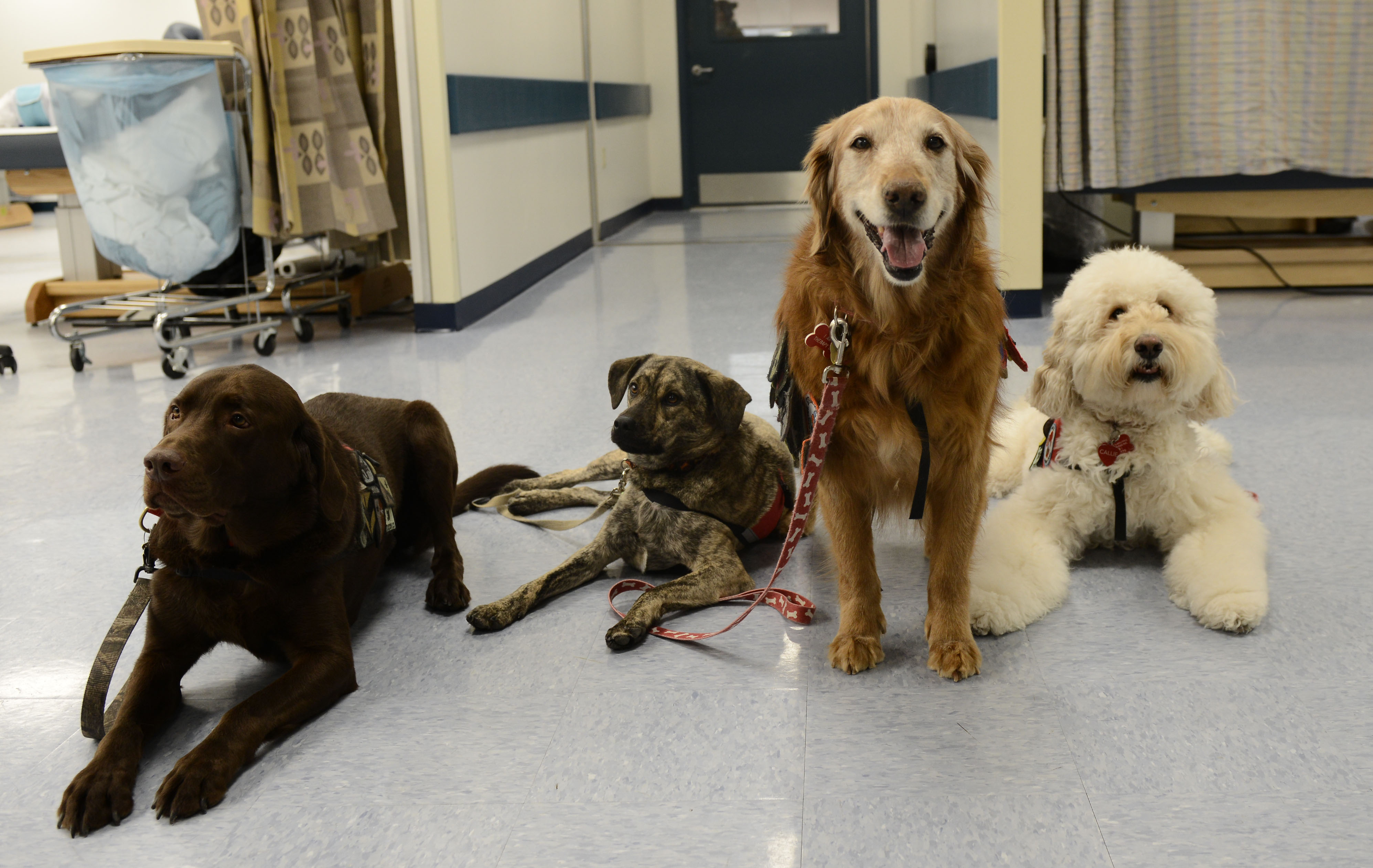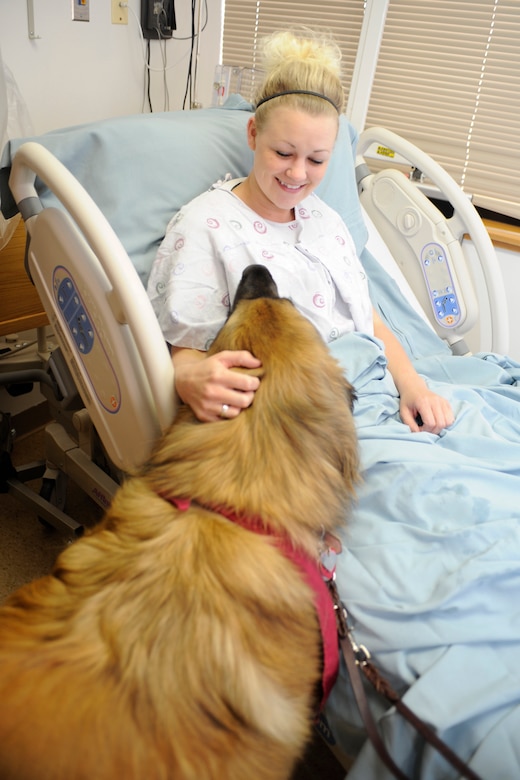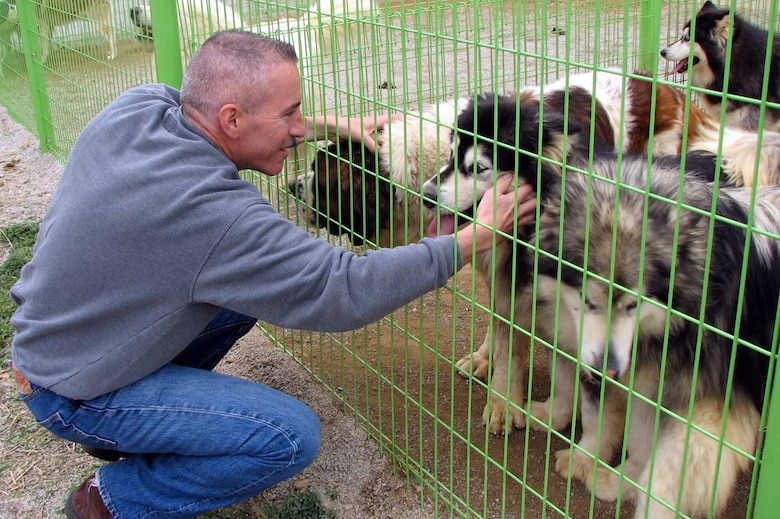COPD is a life-long, chronic disease that can cause a great deal of stress, anxiety, and physical discomfort. Because of this, people with COPD often have to grapple with depression and other psychological issues as a result of living with this difficult disease.
If you have COPD, you might be wondering what you can do to help yourself cope with the worry, fear, and distress that the disease causes. We've addressed this in previous posts on how to treat COPD-related anxiety and depression, but in this article we're going to introduce you to a specific kind of treatment: pet therapy.
Compared to other types of therapy, which often focus on unpacking difficult feelings and finding effective strategies to cope, pet therapy is much less intense. Pet therapy, also known as animal-assisted therapy, is more like a soothing technique, although it can be surprisingly effective at reducing anxiety and helping depressed patients improve their mood.
If playing with animals sounds like an appealing COPD treatment to you, there are a variety of ways you can reap the emotional and psychological benefits that companion animals have to offer. In this article, we're going to tell you all about animal-assisted therapy and how it can benefit patients with COPD.
We'll also show you the variety of options available for experiencing pet therapy for yourself, including ideas for seeking out more opportunities to interact with companion animals in your community. Continue reading to learn all about animal-assisted therapy and COPD, and how you can experience the extraordinary healing power of pets.
What is Pet Therapy?
 |
| Photo by Airman 1st Class Joshua D. King |
Pet therapy is a type of therapy that uses companion animals to help people with special needs or who suffer from physical diseases, disabilities, or mental illness. Animal-assisted therapy can help people with COPD cope with the difficult emotional and psychological aspects of the disease and help treat other mental conditions, like depression and anxiety, that are caused by COPD.
The idea behind pet therapy is simple: animals make people happy. But studies show that pets can do more than just give you a temporary mood lift; they can be powerful tools for warding off anxiety and depression, and even for physical health.
Pet therapy is a broad term that can include therapy dog programs, animal visits to nursing homes and care centers, owning your own pets, or the therapeutic benefits of interacting with animals in general. Sometimes animal-assisted therapy is facilitated by an individual therapy dog owner, and sometimes it is facilitated by a larger program or organization.
However, you can reap many the same benefits of facilitated pet therapy simply by owning your own pet or interacting with animals in general, both of which can be considered a form of pet therapy.
You are most likely to find facilitated pet therapy programs in hospitals, nursing homes, jails, mental rehabilitation centers, and physical rehabilitation centers. They can sometimes be hard to find outside of these settings, although some do home visits or participate in events that are open to the general public.
If you don't own a pet or have access to facilitated pet therapy, there are several other ways you can find animal companionship in your community. For example, volunteering at an animal shelter or spending time with a neighbor's pet can be a great way to unwind with some relaxing pet therapy.
In these next sections, we'll discuss these options and much more in greater detail. We'll help you understand the benefits and drawbacks of pet therapy and what you can do to access animal-related therapeutic activities and services in your local community.
What are the Benefits of Pet Therapy for People With COPD
 |
| Photo by Sgt. 1st Class Jon Cupp |
While no studies have tested the effects of pet therapy specifically on people with COPD, research has proven the effectiveness of pet therapy for a variety of other chronic diseases and conditions. There is a solid body of research on pet therapy that shows it can be surprisingly effective for helping people cope with a variety of physical, emotional and psychological problems that commonly affect people with COPD, including chronic pain, loneliness, and anxiety.
One of the best-researched areas of pet therapy, and the area in which it seems be most effective, is using pet therapy to treat anxiety and to help people cope with stress. Pet therapy has been shown to reduce anxiety, fear, and distress for many types of patients, including:
- Cancer patients
- Veterans with PTSD
- Patients with mental illnesses
- Patients with dementia
- People with addictions
- People in nursing homes and other long-term care facilities
- Elderly adults, which make up a significant portion of COPD patients.

Pet therapy can also help treat depression, which affects more than one quarter of people with COPD. According to several studies, animal-assisted therapy can cause "significant improvement" in depressive symptoms and in patients suffering from clinical depression.
While you can't expect massive or life-changing improvements from animal-assisted therapy, there is robust research to show that it has noticeable, measurable, and clinically significant effects. Even short periods of pet interaction can measurably improve your mood and stress level; one study, for instance, showed that interacting with a therapy dog for just thirty minutes can lower blood pressure and reduce anxiety.
Pet therapy can also reduce physical ailments like chronic pain, a symptom commonly suffered by people with COPD. For example, one study showed that patients with fibromyalgia experienced significantly decreased pain, decreased emotional distress, decreased fatigue, and improved mood after spending only a short period of time with a therapy dog.
Here is a list of some of the most important benefits you can gain from pet therapy:
- Reduced stress and sensitivity to stressors
- Reduced anxiety
- Enhanced mood
- Increased social interaction
- Reduced loneliness
- Reduced depression
- Decreased blood pressure (in the short term)
- Reduced respiratory rate (in the short term)
- Reduced stress hormones
- Increased quality of life
Facilitated Pet Therapy

|
More hospitals, nursing homes, and other physical care facilities are beginning to use therapy dogs and other forms of animal-assisted therapy to help improve happiness, anxiety, and quality of life for their patients. As someone with COPD, you are most likely to have access to facilitated pet therapy in the hospital.
Many hospitals allow therapy dogs to visit patients, and some even house their own animal-assisted therapy groups. If you have COPD, there's a good chance that you will spend some time in the hospital at some point due to an exacerbation or another COPD complication. If you do, you can ask hospital staff if they offer any kind of animal-assisted therapy that you could take advantage of.
Not everyone is lucky enough to get a visit from a therapy dog while in the hospital, but if you do, it can significantly improve your mood and the quality of your stay. If you ever have the opportunity to participate in animal-assisted therapy, you should take it, as long as your doctor says it won't be too risky.
Most of the time, it is difficult to access facilitated pet therapy unless you are residing in a hospital, nursing home, or another long-term care center. However, you may be able to find therapy animals in your area who do home visits or spend time in places that are open to the public.
You could also ask your doctor if there are any animal-assisted therapy programs or events hosted in or near your hospital or medical practice. If they don't offer any kind of pet therapy, you might be able to encourage them to consider utilizing therapy animals in the future.
Service Dogs
Owning your own service dog can confer many of the same benefits of pet therapy while also providing everyday physical support. Service dogs can help patients with COPD in a variety of ways, especially patients who are disabled or suffer from severe limitations in physical mobility.
For example, service dogs can be trained to open doors, retrieve items from the floor, and notify other people nearby if you need help. Having a therapy dog to help with these small tasks can make a big difference in the life of someone with severe COPD.
Therapy dogs can also carry items for you, which reduces your load while walking and allows you to focus your energy on controlling your balance and breathing. If you use supplemental oxygen, you could even use a service dog to carry spare oxygen tanks for you when you're out and about.
And, of course, interacting with a therapy dog on a regular basis can help improve COPD-related stress, anxiety, and depression. The companionship you get from owning a pet, especially a service dog, can also help you feel more confident, less lonely, and more fulfilled in life.
Should You Own Your Own Pet?

You don't need a trained therapy dog or structured animal-assisted therapy to enjoy these improvements in mood, psychological symptoms, and quality of life. Simply owning a pet can confer many of the same benefits as pet therapy.
If you suffer from COPD-related anxiety, depression, or chronic pain, getting a pet can be a huge help for improving your mood and reducing your psychological symptoms. Caring for an animal can also give you a wonderful sense of purpose and belonging, and interacting with your pet on a regular basis can improve both physical and emotional pain.
Owning a pet can also help you establish a healthier, more regular daily routine. For example, it can be helpful if you suffer from depression to have to get up to feed your pet at the same time every morning, or you could use your pet's schedule to help you remember to exercise and take your medications.
For COPD patients, owning a pet can even improve their symptoms by helping them live a more physically active lifestyle. Most pets require exercise and play time, which are great opportunities for people with COPD to get up and moving.
However, there are many reasons why certain people who have COPD cannot or should not own pets. Pets are a major responsibility, and many patients simply don't have the time or energy to take on the task of caring for and cleaning up after a pet.

Another concern is the fact that pets can expose you to extra amounts of allergens and respiratory irritants that could inflame your lungs and make your COPD symptoms worse. Even indoor pets introduce potentially irritating dust and dander into your home, while pets that spend time outside can track in all kinds of pollen, pollution, and other hazardous particles from the outdoors.
Here are some of the things to consider before owning a pet if you have COPD:
- Many animals, especially dogs, require a certain amount of physical activity to care for. If you have very limited mobility or have difficulty walking and exercising because of your COPD, you may not be physically able to take care of a pet that requires regular walks and play time.
- Pet fur can be a problem if your lungs are sensitive to allergens or airborne particulates. Not only do most pets shed--and some shed a lot--but their fur tends to collect pollen, dust, pollution, and other respiratory irritants that could make your COPD worse.
- Some people with COPD find it difficult enough to take care of everyday cleaning tasks and responsibilities. If you own a cat or dog, those cleaning tasks and responsibilities will only multiply as you care for and clean up after your pet.
- If you struggle with exercise or physical tasks you should look for a pet that doesn't require a lot of energy or clean-up, such as a fish, reptile, or bird. If you must get a dog or cat, consider getting a smaller breed that is low maintenance and allergy-friendly.
Luckily, even if you can't own your own pet, you can find many other opportunities for pet therapy if keep your eyes open. In the next section, we'll give you some ideas for how you can find companion animals to interact with in your community, even if you don't have access to a facilitated animal-assisted therapy program.
Taking Pet Therapy Into Your Own Hands

Unfortunately, facilitated pet therapy services aren't as widespread or easy to find as most patients would like. Many pet therapy programs aren't accessible to the general public and only operate in hospitals, nursing homes, and other care centers.
However, there's no need to worry if you are unable to own your own pet or find a pet therapy center near you. Studies show that you don't need a therapy dog or a full-time pet in order reap the benefits of pet therapy; even brief, occasional interactions with animals can have large effects on mood and well-being.
If you wish to own a pet but can't, or simply want to try pet therapy to help you manage your COPD, you can take matters into your own hands and take advantage of opportunities to interact with pets in your local community. That might mean spending more time with your neighbors' pets, volunteering at an animal shelter, or offering to pet sit for friends and family.
Volunteer at an Animal Shelter
|
|
| Photo by Stacy A. Ouellette |
Volunteering to help out with pets in need is of the most rewarding ways to interact with animals. That's what makes volunteering at an animal shelter or humane society such a great alternative to facilitated pet therapy.
At an animal shelter, you will have the opportunity to provide comfort and companionship to a variety of different cats and dogs. It can be an extremely rewarding experience because, in addition to helping yourself, you will be making a difference in the lives of animals who don't have a home or family of their own.
You might be wondering what volunteering in an animal shelter looks like and what kinds of activities you can do with the cats and dogs. The answer will depend on your local shelter's policies; however, most shelters allow public volunteers to walk the dogs and spend time playing and interacting with the animals indoors.
Even if you don't have the energy to roughhouse with the animals or take the dogs on long walks, you can still offer to provide quiet companionship to the older or more mellow animal residents. Some volunteers even come to sit and read to the animals from a book, which can be heartwarming and beneficial to both you and the lonely cats and dogs at the shelter, even if they can't understand the words.
Another benefit of volunteering in an animal shelter is the opportunity to see a variety of different kinds of dogs and cats in all breeds, shapes, and sizes. However, since pets are constantly being shuffled in and out of shelters, you might not be able to see the same animals every time.
Borrow Fluffy Companions from Friends and Family

Another alternative if you don't have an animal of your own is to spend more time with pets that belong to your neighbors, family, and friends. That way, you can reap the benefits of spending time with animals without having to invest your time and money into a pet of your own.
All you have to do is let your friends and family know that you could use an occasional pet companion, and ask if any of their pets would be well suited for the cause. There's a good chance that at least one person has a friendly animal and won't mind you dropping by to pay regular visits.
Spending more time in the home with a friend or family member's pet is also an opportunity to get out and socialize a bit more. This can be particularly helpful if you suffer from depression, because it gives you something to look forward to and a reason to get out of bed and out of the house.
If you don't mind the extra commitment, you might even ask the pet's owner if you can borrow their pet every so often for a longer period of time. Caring for a pet over an afternoon or weekend isn't nearly as difficult as caring for a pet full-time, and it will provide even more time for bonding and relaxing.
Be the Go-To Pet Sitter

Another way you can spend more time with pets that aren't your own is by offering to pet sit for friends, family, and neighbors. That way you can get some pet therapy time while doing someone a big favor at the same time.
For example, if someone you know has a friendly pet that they have to leave behind for a vacation or business trip, offer to look after their pet while they are away. Most pet owners would be happy to leave their pet with a caring companion and appreciate the opportunity to save money on pet care.
If you are retired or work a schedule where you are home during the day, you could offer to check in on your neighbors' dogs or cats while they are away at work. That way, you can get regular pet therapy time while also providing companionship to an animal that would otherwise be left home alone all day.
Even though pet sitting requires you to take on more responsibility than simply petting a therapy dog, it's a win-win-win situation for both you, the animal, and the pet's owner. You get the opportunity for even more animal interaction while helping out both the pet and the person who owns it.
Other Opportunities for Animal Interaction

If you are willing to get creative, there are even more ways connect with other pets if you can't own one of your own. If you have a computer with a decent internet connection, you can even do it from your own home.
One option is to spend some time watching animals on the internet, and we're not just talking about cat videos on YouTube. You can actually watch live-action streaming video of adorable animals in zoos, shelters, and other places all across the world. You can even find some animal shelters with live-cams featuring toys that you can twirl or jiggle with a press of a button, allowing you to actually interact with the cats and dogs from your computer screen!
Here are some examples:
- The Houston Zoo has live cameras streaming footage of a variety of animals every day, including gorillas, giraffes, rhinos, elephants, flamingos, and more!
- This article has a list of interactive webcams that you can use to view and interact with pets at cat and dog shelters and other animal rescue groups. Some have interactive toys, and they're all full of fluffy, adorable pets.
- MangoLink is a website with links to dozens of live animal webcams all across the world. They have streams of every category of animal you can imagine, including birds, farm animals, insects, reptiles, and fish.
Another option, if you are an animal lover and physically able enough, is to volunteer at a zoo or animal rehabilitation center. Some may allow you to participate in some kinds of animal care or feeding, but you may not able to work directly with the animals. However, you may be able to work near them, and you'll have the satisfaction of knowing that you are working to support their care and well-being.

You can also spend time seeking out wild animals in your local area--from a distance, of course. There are many ways you can spot and observe local wildlife, including hiking, bird-watching, and wildlife tracking. Even just putting a bird or squirrel feeder in your yard can provide you with delightful animal sightings from the comfort of your own home.
Conclusion

While pet therapy isn't a cure for the emotional hardships that COPD patients face, it can help people with COPD cope with the stress and anxiety of living with a chronic disease. It can also help people who suffer from COPD-related depression, helping them re-connect with the outside world and overcome feelings of loneliness and isolation.
Pet therapy isn't right for everyone, especially those who have allergies to pet dander or who are extremely sensitive to airborne allergens. But if you like animals and don't have any physical or medical hindrances, pet therapy can be a great addition to your COPD treatment.
If you are interested in pet therapy, you can talk to your doctor, research local pet therapy groups, or seek out opportunities on your own to spend time with animals in your community. You'll not only be helping yourself, but you'll know that the love and connection you share benefits the pets you interact with, too.


.png)




